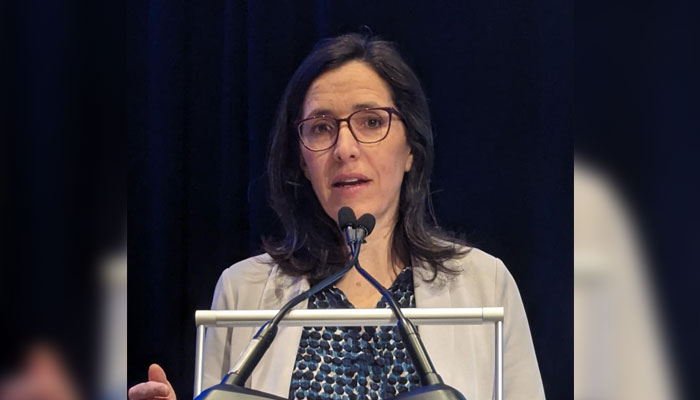US CDC, NIH agree on continued health partnership
Islamabad:Deputy Director of the US Centres for Disease Control and Prevention (CDC) Andi Fristedt visited the National Institute of Health here and emphasised the importance of continued collaboration between the CDC and Pakistan’s public health sector to address health challenges.
She expressed gratitude for the opportunity to meet with NIH officials and highlighted the vital role her centre is playing in strengthening global health security. "I’m happy to be here at the National Institute of Health, as it is an important partner for us [CDC] to strengthen our work for global health security here in Pakistan, around the world, and for Americans, to ensure that we’re stopping outbreaks at their source," she said.
The CDC deputy director said that there was still much work to be done in areas such as flu, hepatitis, and antimicrobial resistance, acknowledging the urgency of these health threats. She also discussed the ongoing efforts to enhance data collection and laboratory infrastructure across Pakistan, which were crucial in responding to emerging diseases.
"We'd great conversations about data work, about laboratories, and how we're strengthening laboratories across Pakistan. We also reflected on the legacy of the CDC’s investment in workforce development and capacity building in Pakistan," she said.
Fristedt noted the significant impact of the CDC’s field epidemiology training programme and other initiatives aimed at building local capacity to tackle public health challenges. "Incredible progress has been made, and we will continue our partnership with public health here in Pakistan," she said, emphasising the CDC’s long-term commitment to improving health outcomes in the region.
The NIH officials, led by their chief executive officer, Dr. Muhammad Salman, thanked Fristedt for the visit saying it highlights the continued collaboration between the CDC and Pakistan's health authorities in building robust health systems and ensuring health security.
Dr Salman said that the stronger NIH-CDC collaboration would help address health threats, improve disease surveillance, and strengthen emergency response systems. Both sides agreed to continue and expand their cooperation to improve public health infrastructure, develop health policies that are data-driven and evidence-based, and ensure that Pakistan is well-prepared to tackle future health crises.
They also discussed joint research initiatives, knowledge exchange, and capacity-building programmes aimed at enhancing the effectiveness and sustainability of Pakistan’s health systems, and agreed to strengthen their partnership.
-
 Royal Family's Approach To Deal With Andrew Finally Revealed
Royal Family's Approach To Deal With Andrew Finally Revealed -
 Super Bowl Weekend Deals Blow To 'Melania' Documentary's Box Office
Super Bowl Weekend Deals Blow To 'Melania' Documentary's Box Office -
 Meghan Markle Shares Glitzy Clips From Fifteen Percent Pledge Gala
Meghan Markle Shares Glitzy Clips From Fifteen Percent Pledge Gala -
 Melissa Jon Hart Explains Rare Reason Behind Not Revisting Old Roles
Melissa Jon Hart Explains Rare Reason Behind Not Revisting Old Roles -
 Meghan Markle Eyeing On ‘Queen’ As Ultimate Goal
Meghan Markle Eyeing On ‘Queen’ As Ultimate Goal -
 Japan Elects Takaichi As First Woman Prime Minister After Sweeping Vote
Japan Elects Takaichi As First Woman Prime Minister After Sweeping Vote -
 Kate Middleton Insists She Would Never Undermine Queen Camilla
Kate Middleton Insists She Would Never Undermine Queen Camilla -
 King Charles 'terrified' Andrew's Scandal Will End His Reign
King Charles 'terrified' Andrew's Scandal Will End His Reign -
 Winter Olympics 2026: Lindsey Vonn’s Olympic Comeback Ends In Devastating Downhill Crash
Winter Olympics 2026: Lindsey Vonn’s Olympic Comeback Ends In Devastating Downhill Crash -
 Adrien Brody Opens Up About His Football Fandom Amid '2026 Super Bowl'
Adrien Brody Opens Up About His Football Fandom Amid '2026 Super Bowl' -
 Barbra Streisand's Obsession With Cloning Revealed
Barbra Streisand's Obsession With Cloning Revealed -
 What Did Olivia Colman Tell Her Husband About Her Gender?
What Did Olivia Colman Tell Her Husband About Her Gender? -
 'We Were Deceived': Noam Chomsky's Wife Regrets Epstein Association
'We Were Deceived': Noam Chomsky's Wife Regrets Epstein Association -
 Patriots' WAGs Slam Cardi B Amid Plans For Super Bowl Party: She Is 'attention-seeker'
Patriots' WAGs Slam Cardi B Amid Plans For Super Bowl Party: She Is 'attention-seeker' -
 Martha Stewart On Surviving Rigorous Times Amid Upcoming Memoir Release
Martha Stewart On Surviving Rigorous Times Amid Upcoming Memoir Release -
 Prince Harry Seen As Crucial To Monarchy’s Future Amid Andrew, Fergie Scandal
Prince Harry Seen As Crucial To Monarchy’s Future Amid Andrew, Fergie Scandal




